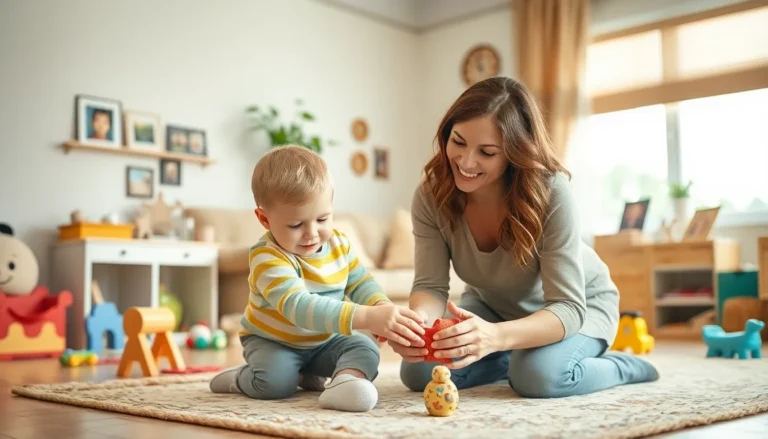Table of Contents
ToggleEvery parent knows that raising kids can feel like herding cats—chaotic and unpredictable. Amidst the tantrums and the endless “why” questions, one parenting strategy stands out like a lighthouse in a stormy sea. It’s the secret sauce that can transform even the most challenging situations into teachable moments, making parenting a tad less daunting and a whole lot more rewarding.
This single most important parenting strategy isn’t just a buzzword; it’s the magic wand that helps parents navigate the wild world of childhood. With the right approach, they can foster resilience, creativity, and confidence in their little ones. So buckle up and get ready to uncover the key to parenting success that’ll have you saying, “I’ve got this!” as you tackle the daily adventures of family life.
Understanding The Single Most Important Parenting Strategy
Embracing a proactive approach stands as the single most important parenting strategy. This mindset transforms chaos into opportunities for growth. When parents tackle challenges head-on, they foster resilience in their children. Consistency in actions and responses builds a secure environment that encourages exploration.
Establishing open lines of communication is essential. Children express thoughts and feelings when they feel heard. Active listening helps parents understand their child’s perspective. Awareness of their emotions lays the groundwork for emotional intelligence, a key aspect of development.
Positive reinforcement strengthens desired behaviors. Celebrating small achievements boosts a child’s confidence and motivation. Parents can set clear expectations while acknowledging efforts, cultivating a growth mindset. It’s vital for children to experience both success and constructive feedback.
Setting boundaries is equally crucial. Clear guidelines provide children with a sense of security. They learn about acceptable behavior and the importance of respect. Redirecting negative actions with understanding leads to teachable moments about responsibility.
Modeling behavior influences a child’s development. Parents who demonstrate empathy and problem-solving skills instill these values in their children. Children often emulate their parent’s actions, making consistent behavior critical.
Finally, patience plays a significant role. Challenges may arise unexpectedly, but approaching them with calm builds resilience. Parents who practice patience in moments of difficulty reflect a healthy attitude towards problem-solving. Prioritizing these strategies enhances overall family dynamics, promoting a rich learning environment.
Benefits Of Implementing This Strategy

Implementing a proactive approach in parenting yields significant benefits, enhancing the overall development of children.
Emotional Development
Emotional intelligence flourishes when parents prioritize open communication. Children feel valued and understood, which fosters their ability to express feelings. As parents encourage this expression, they strengthen the emotional bond within the family. A secure environment promotes confidence, allowing children to explore their emotions without fear of judgment. Parents who model emotional awareness set a positive example, teaching children to recognize and manage feelings effectively. Emotional resilience builds over time, leading to healthier relationships and better coping mechanisms in difficult situations.
Behavioral Improvement
Consistent reinforcement of desired behaviors leads to long-term behavioral improvements. Celebrating small achievements motivates children, promoting a growth mindset. Establishing clear expectations helps children understand boundaries and the rationale behind them. When parents respond positively to good behavior, they create a supportive atmosphere that nurtures growth. Children learn accountability through guidance and modeled behavior, making it easier to adopt acceptable habits. This process not only shapes behavior but also strengthens the parent-child relationship, paving the way for mutual respect and trust.
Practical Tips For Parents
Parents benefit from specific strategies to create a nurturing environment. A focus on consistency and effective communication lays the foundation for healthy relationships and emotional growth.
Establishing Consistency
Consistency plays a pivotal role in effective parenting. Children thrive when they know what to expect from their parents. Setting regular routines, such as mealtimes and bedtime rituals, fosters a sense of stability. Additionally, applying rules consistently leads to a clear understanding of expectations. For example, if a parent enforces screen time limits, sticking to those limits reinforces boundaries. Parents also gain from revisiting established rules as children grow, adapting them to fit their evolving needs. Understanding the importance of consistency empowers parents to cultivate a secure environment that nurtures resilience and confidence in their children.
Communication Techniques
Effective communication bridges the connection between parents and children. Prioritizing open dialogue encourages children to express their thoughts and feelings comfortably. Engaging in active listening shows respect for a child’s perspective, fostering mutual trust. Parents should ask open-ended questions, allowing children to elaborate on their experiences. Moreover, discussing emotions helps children identify and manage their feelings. Techniques like family meetings promote inclusivity and allow everyone to participate in decision-making. When parents model healthy communication, it sets the standard for children as they learn from these interactions. This approach enhances emotional intelligence and strengthens family bonds.
Overcoming Challenges
Parenting involves navigating various obstacles that can complicate the goal of fostering a supportive environment. Commonly, parents face issues such as lack of time, stress, and uncertainty about discipline strategies. Each challenge tests resilience and adaptability, making it essential for parents to recognize these barriers.
Common Obstacles
Limited time often hinders parents from engaging fully with their children. Stress can impact emotional availability, creating a barrier to effective communication. Uncertainty about setting boundaries may lead to inconsistent parenting practices. Further, differing parenting styles between partners can cause confusion for children, complicating efforts to present a united front. Each of these obstacles adds layers to the parenting experience, potentially undermining children’s emotional growth.
Solutions And Support
Establishing a supportive network is crucial to overcoming parenting challenges. Seeking advice from experienced parents or professionals can provide valuable insights. Setting aside dedicated time for family activities fosters connection and engagement. Utilizing resources such as parenting workshops promotes skill development and knowledge. Practicing self-care equips parents to handle stress more effectively, ensuring emotional availability. With these solutions, navigating parenting obstacles becomes manageable, ultimately benefiting both parents and children.
Adopting a proactive approach in parenting is a game changer. It transforms chaos into opportunities for growth and builds a resilient foundation for children. By fostering open communication and modeling positive behaviors, parents create a nurturing environment that encourages emotional intelligence and confidence.
Celebrating small achievements and setting clear boundaries not only guide children but also strengthen the parent-child bond. As parents navigate the challenges of family life, embracing this strategy equips them to handle stress and uncertainty effectively. Through patience and consistency, they can cultivate a rich learning atmosphere that benefits everyone involved.







